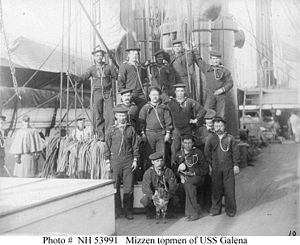Burning of Colón
| Burning of Colón | ||||||||
|---|---|---|---|---|---|---|---|---|
| Part of 1885 Colombia civil strife | ||||||||
 Sailors of the Galena in the 1880s. |
||||||||
|
||||||||
| Belligerents | ||||||||
|
|
|
|
||||||
| Commanders and leaders | ||||||||
|
|
|
|
||||||
| Strength | ||||||||
| unknown | ~100 militia 1 artillery piece |
Land: ~500 marines ~200 sailors 2 artillery pieces Sea: 1 frigate 1 steamer |
||||||
| Casualties 18 killed | ||||||||
The Burning of Colón, or the Panama Incident, was a major event of the Colombian Civil War in 1885. Panamanian rebels loyal to Pedro Prestan destroyed the city by committing arson before retreating after a battle with federal Colombian troops. The episode also included a landing by United States Navy sailors and marines from two warships after the rebels seized American citizens.
In the late 1800s Colombia's political situation was in turmoil as revolution and riots plagued the country. In 1885 another revolution began which spilled into the Isthmus of Panama. On or about March 16 the rebel leader Pedro Prestan occupied the small port of Colón on the Gulf Coast where he was waiting for a shipment of weapons by the American merchant ship Colon of the Pacific Mail Steamship Company. On March 26, Captain John M. Dow, representing the Pacific Mail Steamship Company in Colon, received a letter from the Panamanian sub-Secretary of State informing him that the offloading of any weapons intended for rebels was strictly prohibited. On the following day, Captain Dow received another letter from Secretary General Gomina which advised that he had assumed the position of commander-in-chief of civil and military affairs and should any of the weapons be removed from the Colon then the agent responsible for their delivery might attempt to seek asylum from the American or French naval forces present. Dow then informed the United States consul Mr. Wright who relayed orders from the consul-general Mr. Adamson not to allow any weapons to be offloaded without the permission of the consulate or Captain James O'Kane of the steamer USS Galena, which happened to be in port at the time. So on March 29, when the Colon arrived at Colon with fifty-two packages marked "M", Captain Dow assumed command and ordered that nothing be taken off the ship. This angered Pedro Prestan when he came to pick up his delivery and Dow and three others were then taken under arrest by militiamen, one of the captives was a United States Navy lieutenant named Judd.
...
Wikipedia
